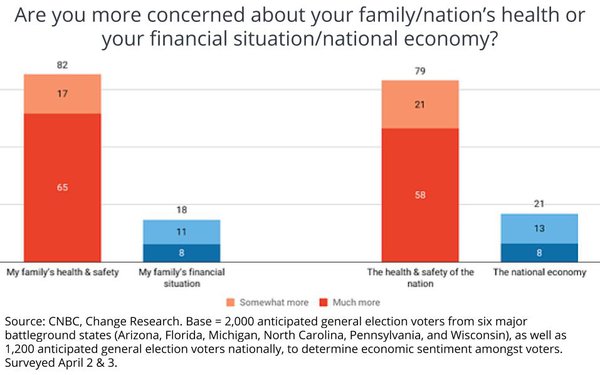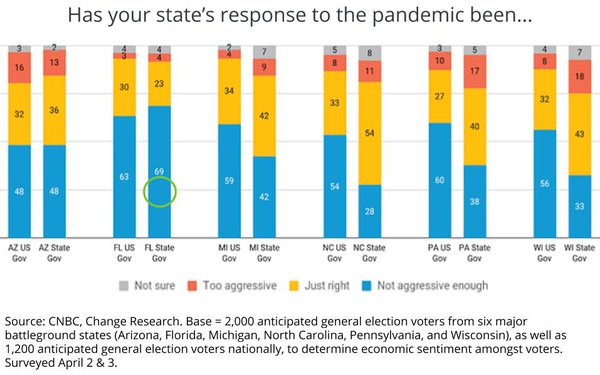Commentary
It's A Lot More Than The Economy, Stupid
- by Joe Mandese @mp_joemandese, April 7, 2020

Yes, in normal times, it is mainly the economy. But these are not normal times, and there's an even bigger existential threat than a financial one on the minds of most Americans, including those in Battleground States.
That's the finding of a new study from CNBC and Change Research, which surveyed two bases of anticipated general election voters: a random national sample; as well as respondents explicitly from six major "battleground states" (Arizona, Florida, Michigan, North Carolina, Pennsylvania and Wisconsin).
The inclusion of that last state is especially relevant and topical today, as Wisconsin holds its state primary in the middle of a pandemic, despite its Democratic governor's executive order to delay it and allow for more mail-in ballots to keep Wisconsin voters out of harm's way.
The decision to stick with today's original primary voting date was the result of the state's Republican-controlled legislature and Supreme Court, as well as a ruling from the U.S. Supreme Court, and based on the CNBC findings, I'm going to guess this will actually backfire for them in the General Election. (See individual state voters' responses below.)
The reason the biggest factor in elections has always "been the economy" is because of the way people are hard-wired to deal with threats. In modern society, most of us feel economically vulnerable to short-term changes in our personal finances, and the macroeconomy -- and the way our government's try to mange it -- the greatest independent variable influencing it.
In our mammalian brains, the economy is a proxy for food, shelter and clothing, so when we cast our votes many of us are thinking -- or at the very least emoting -- which candidate will be best at providing us that short-term security. Never mind that nationally, Democratic Presidents have historically done a better job of managing actual economics, for many voters still feel Republicans might represent a better option, because of their populist laissez faire economic appeals like deregulation, anti-immigration, low taxes (albeit high deficits and national debt), even if they normally don't work out that way.
But I'm going to argue that a pandemic trumps economics as the most pressing issue for most Americans, including those in battleground states, because it is a more immediate and tangible threat to our existence than the security of food, shelter and clothing, or even Netflix.
I can't prove that based on past pandemic elections. The 1918 presidential election -- during the height of the Spanish Flu pandemic -- went to an incumbent Democrat: Woodrow Wilson. But Republicans gained six Congressional seats.
But that was in an era of far less public data and real-time media coverage about the government's handling of the pandemic, as well as the political motivations involved in national, state and local policy decisions (see Wisconsin).
I'm not saying any Republican party leaders are espousing policies that put the health, well-being and lives of their constituents ahead of economics, but it's become abundantly clear by now that Democratic leaders are focused on it with surgical precision.
Look no further than the daily study in contrast of the two major daily pandemic briefings: the one coming from the White House and the one coming from No. 1 hot zone state's governor Andrew Cuomo. One is a poorly improvised reality TV production that keeps changing its narrative like an episode or "The Bachelor," "Survivor," or "The Apprentice." The other is a straightforward, facts-based reality check from a compassionate governor concerned about preserving the lives and well-being of his constituents.
I'm not saying the economy doesn't matter. Of course it does, and the CNBC research shows many Americans are hyper-concerned about it -- and especially their personal finances -- but the research also shows those concerns were heightened by the pandemic's effect on the economy, and to a large extent, the government's handling of it.
I wish it didn't have to be a partisan discussion, but it's pretty clear by now that the policies of federal, state and local governments responding to COVID-19 couldn't be more night and day.
And I don't just mean about decisions to keep states open or to draw hard-line stay-at-home social distancing policies. I mean even those explicitly addressing the economic response.
The $2 trillion stimulus package got approved only after Democrats shifted the focus of beneficiaries from corporations to, well, us. You know -- the ones who vote.


















This reference to the Wisconsin Primary is mis-leading and should be amended to include all the facts.
"The decision to stick with today's original primary voting date was the result of the state's Republican-controlled legislature and Supreme Court, as well as a ruling from the U.S. Supreme Court, and based on the CNBC findings, I'm going to guess this will actually backfire for them in the General Election."
Rather than CNBC, I'd suggest sourcing the Milwaukee Journal, among many that actually followed events in the state as they transpired.
The decision to stick with the original primary date was supported doggedly by Democratic Governor Tony Evers. On March 17th, the day he closed restaurants and bars, he continued to support the 4/7 election. "How long do we potentially leave offices unfilled because we’re into July or August and we haven’t held a general election?" he asked reporters in a conference call, as he supported keeping the election date April 7th.
See Milwukee Journal article: https://www.jsonline.com/story/news/politics/elections/2020/03/17/tony-evers-sticking-wisconsins-april-7-presidential-primary/5073696002/
He issued "Safer at Home 3/24. Still he stuck by the 4/7 date.
While he strongly encouraged absentee balloting, it wasn't until days and even hours before the polls opened that he sought to move the primary.
That is a fact, inconvenient for your article, but an important fact. Also oddly absent from your article.
Oddly absent from the earlier comment: the 5-4 Republican party line vote in the Supreme Court.
Death by lack of imagination...
http://pjlehrer.blogspot.com/2020/03/if-you-live-in-moment-you-dont.html
Let's finish this story.
On April 3rd, Gov. Evers called for moving the primary out of April. https://www.cnn.com/2020/04/03/politics/wisconsin-delays-election-results/index.html
That's five days more notice than Gov. Mike DeWine gave when he yanked the plug on the Ohio primary.
Evers wanted the primary pushed back so that the maximum number of voters could cast their ballot via mail.
But if course the Wisconsin Republicans thought they had a sure-fire means of voter suppression, which blew up in their faces when in an act of resistance hordes of voters showed up and gave the GOP a big middle finger.